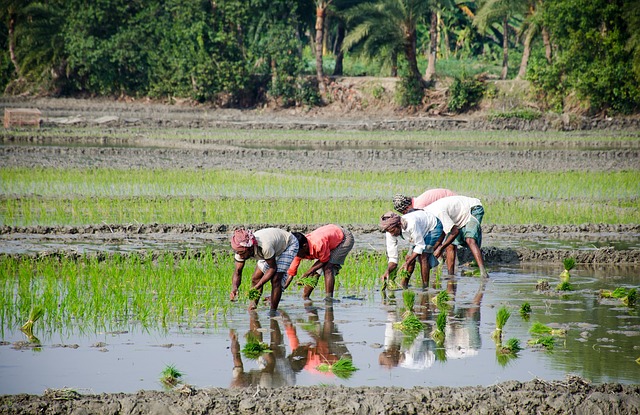Sustainable Farming Practices in India

Sustainable farming has emerged as a crucial approach in India’s agricultural landscape, addressing the twin challenges of increasing food production while conserving natural resources. With a growing population and changing climate patterns, traditional farming methods that heavily rely on chemical fertilizers, pesticides, and excessive water usage are proving to be unsustainable. Farmers and agricultural experts across India are now embracing sustainable farming techniques to ensure long-term soil health, crop productivity, and environmental balance.
At its core, sustainable farming focuses on farming practices that are environmentally friendly, economically viable, and socially responsible. This approach promotes the use of organic fertilizers, crop rotation, integrated pest management, and water conservation methods, reducing the ecological footprint of agriculture. By minimizing chemical inputs and encouraging natural processes, sustainable farming not only enhances soil fertility but also protects biodiversity and promotes healthier ecosystems.
In India, where agriculture is the backbone of the economy and livelihoods of millions depend on farming, adopting sustainable farming is more than a choice—it is a necessity. Traditional knowledge, when combined with modern scientific practices, can lead to higher crop yields, reduced input costs, and improved resilience to climate variability. Techniques such as organic composting, green manuring, and precision irrigation are gaining popularity among progressive farmers across the country.
Moreover, this farming supports rural development by creating employment opportunities and empowering communities with knowledge and skills to manage natural resources responsibly. As India moves toward a greener and more resilient agricultural system, the adoption of sustainable farming practices becomes essential not only for food security but also for environmental sustainability and economic growth.
Key Sustainable Farming Practices in India
To make agriculture more resilient and eco-friendly, Indian farmers are increasingly adopting sustainable farming practices. These techniques focus on maximizing productivity while preserving soil health, conserving water, and reducing chemical dependency. Below are some of the most effective methods being implemented across the country.
- Organic Fertilizers and Composting
One of the pillars of sustainable farming is the use of organic fertilizers and compost. Unlike chemical fertilizers, organic options such as farmyard manure, vermicompost, and green manure improve soil structure, enhance microbial activity, and provide essential nutrients naturally. Composting kitchen and farm waste not only reduces environmental pollution but also helps in recycling nutrients back into the soil, fostering long-term fertility.
- Crop Rotation and Diversification
Crop rotation is a vital practice in sustainable farming, helping to prevent soil depletion and reduce pest infestations. Alternating crops such as legumes, cereals, and vegetables allows nutrients to replenish naturally, maintaining soil fertility. Crop diversification also minimizes economic risk for farmers by reducing dependency on a single crop and ensures a steady income throughout the year.
- Integrated Pest Management (IPM)
Sustainable farming emphasizes minimizing chemical pesticide usage through Integrated Pest Management. IPM combines biological control, cultural practices, and mechanical methods to manage pests effectively. Natural predators, trap crops, and organic sprays help maintain ecological balance while protecting crops, reducing harmful chemical residues, and supporting human health.
- Water Conservation Techniques
With water scarcity becoming a pressing issue, water-efficient practices are central to sustainable farming. Methods like drip irrigation, rainwater harvesting, and mulching help conserve water while ensuring optimal crop growth. These techniques not only reduce water wastage but also improve soil moisture retention and enhance crop yield.
- Soil Conservation and Land Management
Soil erosion and degradation are major challenges for Indian agriculture. Practices such as contour farming, terracing, and cover cropping protect topsoil, maintain fertility, and reduce environmental impact. By maintaining healthy soil through sustainable farming, farmers ensure that their land remains productive for future generations.
Adopting these practices allows Indian farmers to achieve higher efficiency, better quality produce, and long-term sustainability. With support from government initiatives, agricultural organizations, and modern technology, sustainable farming is gradually transforming the country’s agriculture into a more resilient, eco-friendly, and profitable sector.
Conclusion
Embracing sustainable farming practices in India is no longer an option—it is a necessity for ensuring food security, environmental balance, and long-term agricultural prosperity. By adopting methods such as organic fertilizers, composting, crop rotation, integrated pest management, and water conservation, farmers can enhance soil health, increase crop yield, and reduce dependence on harmful chemicals. These practices not only improve productivity but also protect biodiversity, conserve natural resources, and empower rural communities with knowledge and sustainable livelihoods.
The transition to sustainable farming also aligns with global efforts to combat climate change and promote eco-friendly agriculture. Indian farmers who integrate traditional wisdom with modern techniques are witnessing tangible benefits, from healthier crops and improved soil fertility to cost savings and greater resilience against unpredictable weather patterns.
For farmers looking to implement these practices effectively, Indochemagrovet offers high-quality solutions, including organic fertilizers, bio-fertilizers, and soil conditioners designed to support sustainable agriculture. Partnering with trusted experts like Indochemagrovet ensures that your farm thrives while staying environmentally responsible. Start your journey towards sustainable farming today and contribute to a greener, more productive India.
Do you want to boost your farm’s productivity with eco-friendly solutions!
Partner with Indochemagrovet for high-quality organic fertilizers, bio-fertilizers, and soil conditioners tailored to support sustainable farming. Achieve healthier crops, improved soil fertility, and long-term farm success today!
📞 Call Now: +91 9830 720311 / 83369-77770
🌐 Visit: https://indochemagrovet.in
Mumbai Office: Parewala House No.4, Vakola, Santacruz (East), Mumbai 400055
Kolkata Office: Block – DD, House No-197, 1st Floor, Street No-295, Action Area-1, New Town, Kolkata, West Bengal 700156

